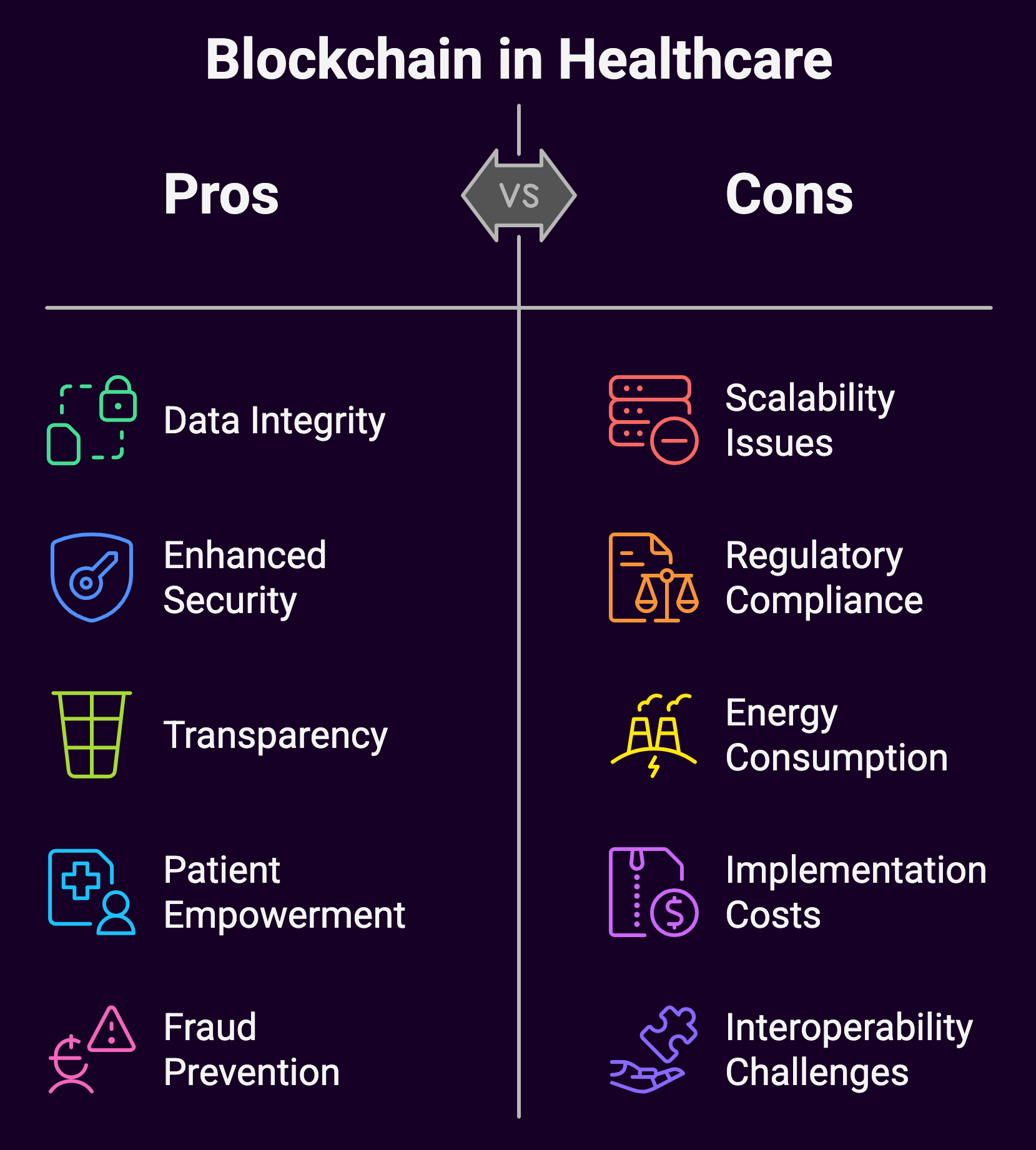The healthcare industry is at a pivotal juncture, grappling with the pressing need to embrace technological advancements while safeguarding the integrity and privacy of patient data. As the custodians of our most intimate and sensitive information, healthcare providers face an array of challenges, from ensuring accurate billing practices to maintaining the confidentiality of medical records. Enter blockchain technology, a disruptive force that promises to revolutionize the way we approach data management and secure transactions in the healthcare realm.
 At its core, blockchain is a decentralized, immutable ledger that records transactions across multiple nodes in a network, eliminating the need for a centralized authority. This innovative technology has the potential to transform various aspects of the healthcare industry, from streamlining administrative processes to enhancing patient empowerment and trust.
At its core, blockchain is a decentralized, immutable ledger that records transactions across multiple nodes in a network, eliminating the need for a centralized authority. This innovative technology has the potential to transform various aspects of the healthcare industry, from streamlining administrative processes to enhancing patient empowerment and trust.
The undermentioned content highlights the profound impact blockchain can have on secure billing and data integrity in healthcare, exploring its underlying principles, real-world applications, and the challenges that lie ahead.
The Blockchain Advantage: Immutability and Transparency
One of the most compelling features of blockchain technology is its inherent immutability. Once data is recorded on the blockchain, it becomes virtually impossible to alter or tamper with, providing an unprecedented level of data integrity and trust. This characteristic is particularly invaluable in the healthcare sector, where accurate and tamper-proof medical records are crucial for preserving patient safety and facilitating informed decision-making.
Blockchain’s decentralized nature and transparency foster a heightened level of trust among stakeholders. Each participant in the network maintains a copy of the ledger, ensuring that no single entity has absolute control over the data. This distributed architecture eliminates the need for a central authority, reducing the risk of data breaches and promoting greater accountability.
Secure Billing and Claims Processing
The complexities of medical billing and claims processing have long been a thorn in the side of providers, payers, and patients alike. Traditional systems are often plagued by inefficiencies, errors, and susceptibility to fraud, resulting in significant financial losses and administrative burdens. Blockchain technology offers a promising solution to these longstanding challenges, streamlining the billing process and enhancing transparency and security.
 One of the key advantages of blockchain in medical billing is its ability to create an immutable and auditable trail of transactions. Every claim, payment, and adjustment is recorded on the distributed ledger, creating a transparent and tamper-proof record that can be accessed and verified by all authorized parties. This level of transparency not only reduces the risk of fraudulent activities but also facilitates faster and more accurate claims processing, ultimately leading to improved cash flow and reduced administrative costs.
One of the key advantages of blockchain in medical billing is its ability to create an immutable and auditable trail of transactions. Every claim, payment, and adjustment is recorded on the distributed ledger, creating a transparent and tamper-proof record that can be accessed and verified by all authorized parties. This level of transparency not only reduces the risk of fraudulent activities but also facilitates faster and more accurate claims processing, ultimately leading to improved cash flow and reduced administrative costs.
Smart contracts (self-executing agreements encoded on the blockchain) can automate various aspects of the billing process. These contracts can be programmed to verify eligibility, authorize payments based on predefined criteria, and trigger automatic reimbursements, minimizing the need for manual intervention and reducing the potential for human error.
Electronic Health Records (EHRs) and Data Interoperability
The advent of Electronic Health Records (EHRs) has revolutionized the way patient data is stored and accessed. However, the current landscape of EHR systems is fragmented, with data often siloed within individual healthcare organizations, hindering seamless information sharing and interoperability. Blockchain technology offers a promising solution to this challenge by enabling secure, decentralized data exchange and storage. This enables medical providers to connect an EHR to a clearinghouse, with ease.
Leveraging blockchain’s distributed architecture allows patient data to be securely shared across multiple healthcare providers, eliminating the need for centralized data repositories that are vulnerable to breaches and single points of failure. Each patient’s health record can be stored as a unique, immutable block on the blockchain, accessible only to authorized parties with the appropriate permissions.
Moreover, blockchain’s cryptographic capabilities ensure that patient data remains encrypted and secure during transmission, safeguarding sensitive information from unauthorized access or tampering. This level of data security and privacy is essential in building trust among patients and fostering a more collaborative and efficient healthcare ecosystem.
Supply Chain Management and Counterfeit Drug Prevention
The integrity of the pharmaceutical supply chain is of paramount importance, as counterfeit or substandard drugs can pose serious risks to patient safety and public health. Blockchain technology offers a robust solution to combat this issue by establishing an immutable and transparent record of every step in the supply chain, from manufacturing to distribution and dispensation.
 Through leveraging blockchain’s traceability capabilities, stakeholders can track the movement of pharmaceutical products in real-time, verifying their authenticity and provenance at every stage. Each batch of drugs can be assigned a unique digital signature or identifier, which is recorded on the blockchain alongside relevant details such as manufacturing date, expiration date, and batch number.
Through leveraging blockchain’s traceability capabilities, stakeholders can track the movement of pharmaceutical products in real-time, verifying their authenticity and provenance at every stage. Each batch of drugs can be assigned a unique digital signature or identifier, which is recorded on the blockchain alongside relevant details such as manufacturing date, expiration date, and batch number.
This level of transparency and traceability not only enhances supply chain visibility but also facilitates rapid identification and recall of counterfeit or compromised products, minimizing potential harm to patients. Furthermore, smart contracts can be employed to automate various supply chain processes, such as inventory management and quality assurance, reducing the risk of human error and improving overall operational efficiency.
Patient Empowerment and Data Ownership
One of the most transformative aspects of blockchain technology in healthcare is its potential to empower patients and grant them greater control over their personal data. Traditional healthcare systems often treat patient data as a commodity, with individuals having limited visibility into how their information is shared and utilized. Blockchain offers a paradigm shift by enabling patients to maintain ownership and control over their medical records, fostering trust and transparency.
Using blockchain-based platforms enables patients to securely store and manage their health data, granting selective access to healthcare providers or third parties as needed. This level of control and transparency empowers individuals to make informed decisions about their healthcare journey, while also reducing the risk of data breaches and unauthorized access.
Blockchain’s decentralized nature allows patients to seamlessly share their medical records across multiple healthcare providers, eliminating the need for repetitive data entry and ensuring continuity of care. This not only enhances the patient experience but also promotes better clinical decision-making by providing healthcare professionals with a comprehensive view of an individual’s medical history.
Research and Clinical Trials
The field of medical research and clinical trials is inherently reliant on the integrity and validity of data. Blockchain technology offers a robust solution to ensure the authenticity and transparency of research data, safeguarding against potential manipulation or fraud.
 Leveraging the immutability of blockchain allows researchers to securely record and timestamp all data points, ensuring that the integrity of the information remains intact throughout the entire research process. This level of data provenance and auditability is crucial in maintaining the credibility and reproducibility of scientific findings, ultimately fostering trust in the research community.
Leveraging the immutability of blockchain allows researchers to securely record and timestamp all data points, ensuring that the integrity of the information remains intact throughout the entire research process. This level of data provenance and auditability is crucial in maintaining the credibility and reproducibility of scientific findings, ultimately fostering trust in the research community.
Blockchain-based platforms can facilitate secure and transparent data sharing among researchers, enabling collaborative efforts and accelerating the pace of medical discoveries. Smart contracts can be employed to automate various aspects of clinical trial management, such as participant recruitment, data collection, and regulatory compliance, streamlining processes and reducing administrative burdens.
Blockchain in Medical Credentialing
Blockchain in credentialing offers a revolutionary approach to managing and verifying healthcare professionals’ qualifications, licenses, and certifications through secure, decentralized networks.
This technology addresses critical challenges in healthcare workforce management by creating tamper-proof digital records of medical degrees, board certifications, continuing medical education credits, and professional licenses that can be instantly verified across hospitals, clinics, and healthcare systems. The immutable nature of blockchain ensures that fraudulent credentials cannot be altered or fabricated, while smart contracts can automatically track license renewals, specialty certifications, and mandatory training requirements.
For healthcare organizations, this streamlines the credentialing process from months to days, reduces administrative costs, and enables faster onboarding of qualified medical professionals during staffing shortages or emergency situations. Medical professionals benefit from portable, universally recognized credentials that follow them throughout their careers, eliminating repetitive paperwork when transitioning between institutions or practicing across state lines.
With telemedicine and cross-border healthcare collaborations expanding, blockchain in medical credentialing provides the trust infrastructure necessary to verify practitioner qualifications in real-time, ultimately improving patient safety and care quality while reducing the administrative burden that often keeps healthcare providers from focusing on patient care.
Challenges and Considerations
While the potential benefits of blockchain technology in healthcare are undeniable, its widespread adoption is not without challenges. One of the primary concerns is the scalability and performance of blockchain networks, as they may struggle to handle the vast volumes of data generated in the healthcare sector. Additionally, the energy-intensive nature of certain consensus mechanisms, such as Proof-of-Work, raises questions about the environmental sustainability of blockchain solutions.
 Another significant challenge lies in the realm of regulatory compliance and data privacy. The healthcare industry is subject to stringent regulations, such as the Health Insurance Portability and Accountability Act (HIPAA) and the General Data Protection Regulation (GDPR), which govern the handling and protection of sensitive patient data. Ensuring that blockchain-based solutions adhere to these regulations while maintaining data integrity and patient privacy is a critical consideration.
Another significant challenge lies in the realm of regulatory compliance and data privacy. The healthcare industry is subject to stringent regulations, such as the Health Insurance Portability and Accountability Act (HIPAA) and the General Data Protection Regulation (GDPR), which govern the handling and protection of sensitive patient data. Ensuring that blockchain-based solutions adhere to these regulations while maintaining data integrity and patient privacy is a critical consideration.
Furthermore, the successful implementation of blockchain technology in healthcare relies heavily on industry-wide collaboration and adoption. Stakeholders, including healthcare providers, payers, pharmaceutical companies, and regulatory bodies, must work together to establish common standards, protocols, and governance frameworks to ensure interoperability and seamless integration of blockchain solutions.
The Pros and Cons of Blockchain in Healthcare

Summary: Blockchain in Healthcare
The healthcare industry stands at the precipice of a transformative era, where the convergence of cutting-edge technologies and a renewed focus on patient-centric care are reshaping the landscape. Blockchain technology, with its inherent characteristics of immutability, transparency, and decentralization, presents a compelling solution to address long-standing challenges in secure billing, data integrity, and supply chain management.
![]()
Embracing blockchain enables healthcare organizations to streamline administrative processes, enhance data security and interoperability, and empower patients with greater control over their personal information. However, the successful adoption of this disruptive technology will require a collaborative effort among stakeholders, addressing scalability concerns, regulatory compliance, and fostering a culture of innovation and trust.
While navigating the complexities of the healthcare ecosystem, it’s essential to remain open to disruptive technologies that have the potential to revolutionize patient care, data management, and operational efficiencies. Blockchain (in healthcare) is poised to play a pivotal role in this transformative journey, ushering in a new era of secure, transparent, and patient-centric healthcare.
Contact us to assist with your blockchain billing and credentialing needs and/or challenges.

